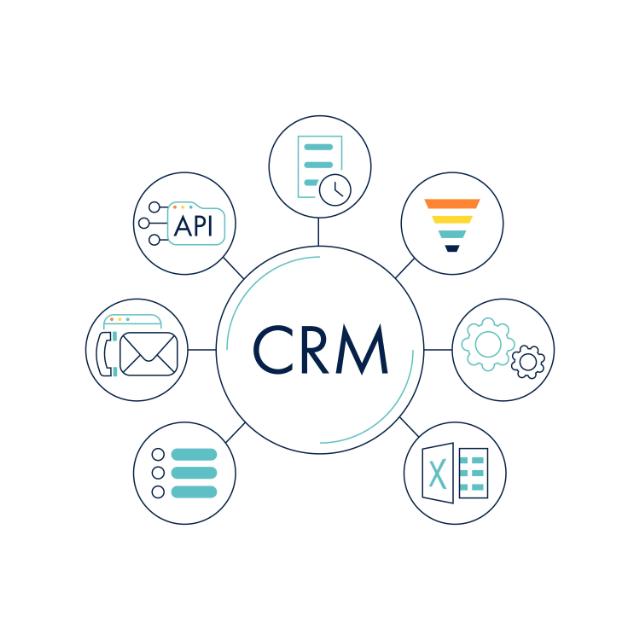Blog
9 Best Practices for a Stress-Free eCommerce CRM Integration
DynamicWeb
Learn why it is important to integrate eCommerce with CRM and the best practices to follow for successful and stress-free integration.
Learn why it is important to integrate eCommerce with CRM and review best practices for successful eCommerce automation.
Digital marketing hinges on personalization; perhaps no brands understand this better than eCommerce sellers. In fact, personalization has become so ubiquitous among eCommerce leaders it has become essential to the eCommerce experience itself.
That’s why, in this blog, we’ll discuss the importance of integrating your eCommerce with your customer relationship management (CRM) software – the complete source of truth for understanding and managing your customer relationships.
DOWNLOAD NOW – FREE WHITE PAPER – Exploring the experiential: 7 keys to creating the best online customer experience possible

Why integrate eCommerce with CRM?
Marketers need access to a range of data points to personalize and automate marketing experiences. Thanks to advancements in integration tools and a growing ecosystem of apps, CRM solutions can consolidate data from several different channels in real time, including email, phone, customer support, social media, eCommerce, and more. For eCommerce sellers, having the customers’ eCommerce data points integrated into CRM, and vice versa is crucial in consistently personalizing eCommerce and marketing experiences at every touchpoint.
10 best practices for integrating eCommerce and CRM
- Choose the right eCommerce and CRM platforms: Some eCommerce platforms are less open to integration than others, so be sure to choose an eCommerce platform flexible enough to integrate with the necessary points in your CRM solution. Look for an open integration framework that provides the flexibility for integrating eCommerce and CRM systems so the blended data can be used for personalized experiences.
- Sync data from sales orders: By flowing sales orders from eCommerce to the ERP and CRM, sales and marketers gain a holistic view of the customer’s purchase history, which can be used for product recommendations. For example, suppose a customer purchases items from your store. In that case, you can use the data from the CRM system to create an individualized email sequence that encourages them to buy more products that complement their past purchases.
- Integrate online quotes: Similar to sales orders, integrating online quotes with customer records in CRM can help sales reps manage opportunities. For instance, sales reps can review quotes to identify VIP customers who may appreciate more attention from sales representatives. However, the bidirectional integration required by the quoting process can be complicated, so be sure to work with a provider that can handle such integrations.
- Leverage website behavior: The right eCommerce platform can let you associate website behavior with customer records in CRM to target visitors based on pages viewed or actions taken. This information is essential for understanding each buyer’s journey and creating personalized experiences for each buyer across channels.
- Maintain up-to-date customer records and preferences: When customers update their name in their website login, you want your ongoing communications to reflect that. This includes contact details, purchase history, preferences, and other relevant information. When the eCommerce platform and CRM software integrate, there is only one source of information. Instead of wasting time auditing customer details or mixing up data, you can trust that customer details are always accurate and updated in real-time.
- Personalize marketing communications: Leverage the integrated CRM and eCommerce data to deliver personalized marketing messages and tailored recommendations to your customers. Use customer segmentation based on their behavior and purchase history to target specific groups with relevant offers. For instance, some shoppers may respond more positively to back-to-school sales than others.
- Measure your top customers: Gain an understanding of your top customers to build similar audiences to target outside of your database. Offer exclusive promotions or loyalty programs based on the customer’s lifetime value.
- Automate nurture and follow-up: By integrating your eCommerce with CRM, your new customers can automatically get created as new records in your CRM for continued nurturing and follow-up from marketing. Leverage CRM information and multichannel eCommerce capabilities to cultivate and sustain rich customer relationships.
- Continuously optimize: While getting a successful system up and running can be a huge relief, the work is never completely done. In the world of eCommerce, companies must continuously optimize. When you notice yourself, your team, or your customers having to enter data that is already stored in one system, use it as an opportunity to integrate those data points and processes to streamline the customer experience.
- Consider a headless approach for maximum flexibility: As DynamicWeb's headless architecture demonstrates, decoupling your front-end and back-end systems through APIs allows for greater flexibility in content delivery and faster adaptation to market changes. A headless approach enables seamless integration between your CRM and multiple customer touchpoints beyond your website, including mobile apps, kiosks, and custom displays.
eCommerce and CRM integration with DynamicWeb
A successful CRM and eCommerce integration is the key to delivering personalized customer experiences that win business and build lasting brand loyalty. However, not all integration requirements are simple and can involved extensive technical knowledge and expertise or the right digital solution partnership.
DynamicWeb’s open integration framework gives businesses an advanced starting point that includes standard templates for integration of eCommerce and CRM systems like Microsoft Dynamics 365. Companies that choose DynamicWeb can collect and store data from onsite behavior, purchase historys and email marketing activities in the CRM system. They use the successful integration to empower sales and marketing teams with valuable customer insights and optimize customer experiences.
To learn more, download our free white paper – Exploring the experiential: 7 keys to creating the best online customer experience possible.
—
References:
https://dynamicweb.com/products/digital-marketing
https://dynamicweb.com/resources/insights/blog/9-top-ecommerce-personalization-trends-to-try-in-2023
https://dynamicweb.com/products/ecommerce
https://dynamicweb.com/accelerators/integration
https://dynamicweb.com/resources/downloads/white-papers/exploring-the-experiential
https://dynamicweb.com/technology/headless
https://dynamicweb.com/
https://dynamicweb.com/solutions/ms-dynamics-365-sales-crm